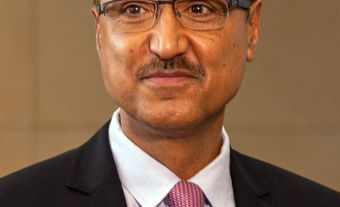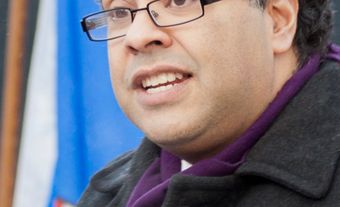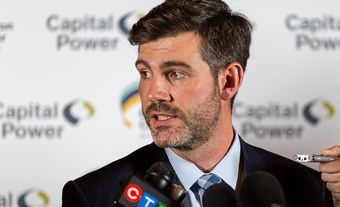Brian Thomas Douglas Bowman, judge, lawyer, mayor of Winnipeg 2014–22 (born 18 August 1971 in Winnipeg, MB). A Métis lawyer specializing in privacy rights and social media, Brian Bowman was elected Winnipeg’s first Indigenous mayor on 22 October 2014. A business-minded centrist, Bowman served two full terms before stepping down in 2022. He was appointed a judge for the Court of King’s Bench in December 2023.

Early Life and Law Career
Brian Bowman was born to a skilled tradesman father and real estate agent mother in 1971. He grew up largely in Winnipeg’s middle class suburb of Charleswood.
Bowman completed a history and political science degree at the University of Manitoba. He then graduated from the University of Toronto’s law school. While in law school, he was elected president of the Students' Law Society.
As a student, Bowman was active in the federal and provincial Progressive Conservative (PC) parties. He served as president of the party’s Manitoba youth wing. He also worked on Joe Clark's campaign during Clark’s comeback as federal PC leader in 1998.
Shortly after completing law school in 1999, Bowman moved back to Winnipeg with his wife, Tracy Kozar Bowman, to begin his career as a lawyer. He focused his practice on privacy, access to information and social media law. Prior to running for mayor, Bowman was a partner at Pitblado, a major Winnipeg law firm.
While practising law, Bowman raised his public profile as chair of the Winnipeg Chamber of Commerce and the Winnipeg Art Gallery. He was also a frequent media commentator on social media and privacy issues. In 2011, Bowman was touted as a possible candidate to lead the provincial PC Party of Manitoba, following the resignation of leader Hugh McFadyen.
2014 Municipal Election
The 2014 municipal campaign in Winnipeg began against a backdrop of public concern over questionable business and land deals involving outgoing Winnipeg mayor Sam Katz and senior city hall officials.
Brian Bowman entered the race on 6 May 2014. He spent much of the summer trailing front-runner Judy Wasylycia-Leis, a former NDP Member of Member of Parliament making her second bid for mayor. Five other candidates, including two former city councillors, were also on the ballot.
Business-minded and centrist in his politics, Bowman modelled himself after other popular mayors in Western Canada such as Edmonton’s Don Iveson and Calgary’s Naheed Nenshi. He pledged to run a positive campaign, a vow he largely kept.
Lacking any experience in government or with city hall, Bowman was criticized for offering an overly ambitious platform. It included pledges to build six legs of a rapid transit system in 15 years. He promised to boost the downtown’s anemic residential population and cap property tax increases to the rate of inflation. He also pledged to run a clean, innovative and transparent government. He contrasted himself frequently with Wasylycia-Leis, a career politician.
Bowman’s campaign was managed by a team of young political organizers, including many Tories. They relied heavily on social media, branding and technology to get out the vote. Bowman earned some high-profile endorsements, including that of former Manitoba premier Gary Filmon and Winnipeg Jets owner Mark Chipman.
In the days leading up to the 22 October election, it appeared to many that Wasylycia-Leis was likely to win. But on election night Bowman won a surprising victory with 47.5 per cent of the vote. With strong support from the suburbs, he received 111,504 votes, nearly double the 58,440 votes earned by Wasylycia-Leis.
Mayor
Brian Bowman was sworn in as Winnipeg’s 43rd mayor on 4 November 2014. He is considered Winnipeg’s first Indigenous mayor, claiming Red River Métis heritage. He would go on to win re-election in 2018, with 53.3 per cent of the vote.
In January 2015, a Maclean’s magazine cover story called Winnipeg “Canada’s most racist city.” This set off a heightened discussion on Indigenous relations in the city. Bowman called a news conference with Indigenous leaders and spoke emotionally of his Métis heritage, which had not been a significant theme in his campaign. Later, Bowman hosted an anti-racism summit and declared 2016 a year of reconciliation. Reconciliation between government and Winnipeg’s Indigenous community remained a major theme of his mayorship. When Bowman left office in 2022, councillor Sherri Rollins said, “his best achievement was sustaining the dialogue on reconciliation in Winnipeg.”
Bowman’s first years in office were largely spent reorganizing and recruiting top civic officials and dealing with the fallout from a police headquarters project that was dramatically over-budget and mired in allegations of corruption. In response, he supported a provincial inquiry into the city’s handling of the project and other real estate deals. He also led the development of a municipal asset management program designed to track and improve the quality of municipal infrastructure, such as parks, roads and watermains.
Bowman’s flagship municipal plan, “OurWinnipeg 2045,” was approved in May 2022. The plan contained 21 policy objectives on themes of sustainability, equity and growth. It included a transportation master plan, a waste disposal plan and a climate action plan. It also specified several ways to measure progress on policy objectives, such as population, housing starts, high school graduation rates and water usage.
However, some of Bowman’s moves also drew criticism. In order to finance infrastructure to match Winnipeg’s growing population, Bowman introduced a development fee in 2016. It taxed developers $500 per 100 square feet of new residential development. The rollout of the fee sparked outcry from developers. In 2017, the Urban Development Institute and the Manitoba Home Builders’ Association initiated a legal challenge to the policy. In 2020, a provincial court ruled that while it was reasonable for the city to initiate the program, parts of the program were unconstitutional. The city was forced to repay $30 million that it had collected under the program. Bowman stressed that the ruling validated the municipality’s right to levy an impact fee in principle.
Bowman’s ambitious platform was only partially achieved during his time as mayor. He had campaigned for the completion of six rapid-transit routes in Winnipeg by 2030, each with a dedicated bus lane. By the time he left office in November 2022, only one of those projects had been completed — a 7 km extension of the Southwest Transitway. No clear plan was in place for the others.
Some of the obstacles were a product of timing. During Bowman’s first couple of years in office, the government of Manitoba — led by the NDP premier Greg Selinger — was highly supportive of municipal infrastructure projects. But in 2016, the Progressive Conservative Brian Pallister entered the premier’s office with no plans to provide funding beyond the Southwest Transitway.
The COVID-19 pandemic also posed problems for Bowman’s transit agenda because it led to a precipitous fall in ridership. The city also had to spend nearly $700,000 on repairs to bus shelters — possibly related to the spike in homelessness that occurred during the pandemic, leading some to take refuge in bus shelters.
Other elements of Bowman’s transit plans had mixed success. He delivered on his pledge to expand the number of heated bus shelters. With the support of city council, he also made progress on the city’s longstanding efforts to improve pedestrian and cycling infrastructure. But his proposal for free wi-fi on city buses was abandoned in 2019 after a pilot project.
Towards the end of Bowman’s term, he acknowledged that his policies to reduce homelessness had been a disappointment. His 10-year plan to end homelessness did not rely on funding from higher levels of government. This strategy had not succeeded, he stated, in part because Premier Pallister was “missing in action” on the issue.
Bowman chose not to run in the 2022 Winnipeg mayoral election. It was won by Scott Gillingham, a fiscally conservative former pastor and city councillor.
Personal Life and Other Activities
Brian Bowman and his wife, Tracy Kozar Bowman, have two sons: Hayden and Austin. Bowman has served as chair for the Winnipeg Art Gallery, the Winnipeg Chamber of Commerce, the University of Manitoba Alumni Association, the Canadian Bar Association's privacy and access law section, and the Manitoba Bar Association's technology and intellectual property law section. He has also coached his son Hayden’s hockey team.
Career After Politics
In June 2023, Brian Bowman began working for Winnipeg-based insurance and financial services company Canada Life as its vice-president of sustainability and social impact. In December 2023, the federal Department of Justice announced that Bowman had been appointed a judge for the Court of King’s Bench in Manitoba.
See also Politics in Manitoba.

 Share on Facebook
Share on Facebook Share on X
Share on X Share by Email
Share by Email Share on Google Classroom
Share on Google Classroom

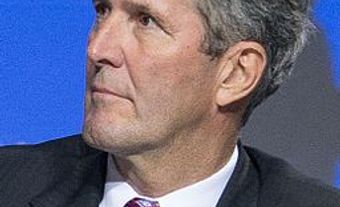
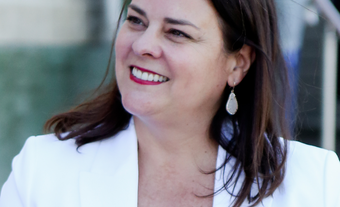
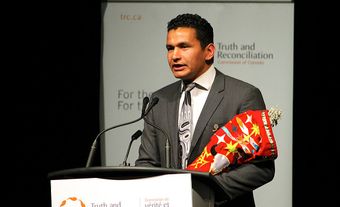
.jpg)
